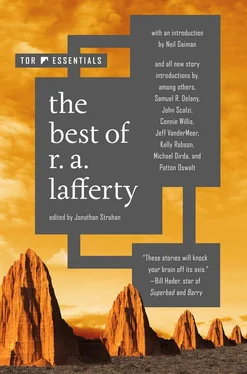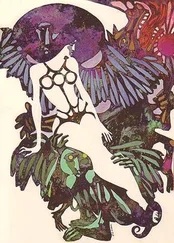“I wasn’t trying to get home. I was trying to get back to those girls even if it killed me. There weren’t any colors in that world, all gray tones, but otherwise it wasn’t much different from this one. There were even bars there a little like the Red Rooster.”
(I forgot to tell you that it was in the Red Rooster bar that the soldier from the islands told me the parts of his story.)
“I’ve got to get back there. I think I know the way now, and how to get on the road. I have to travel it through the middle land, you know. They’ll kill me, of course, and I won’t even get to jazz those girls for five minutes; but I’ve got to get back there. Going to take me another twenty years, though. That sure is a weary walk.”
I never knew him well, and I don’t remember which of the names was his. But a man from Orange, Texas, or from Gobey, Tennessee, or from Boston, in one of the eastern states, is on a twenty-year walk through the middle land to find the dark Dutch Margarets, and death.
I looked up a couple of things yesterday. There was Revel’s recent work on Moluccan narcotics. He tells of the besok nut which does seem to inhibit aging but which induces internal distraction and hypersexuality. There is the pokok ru whose bitter bark impels even the most gentle to violent anger. There is one sort of telor tuntong which sets up an inexplicable aura about a woman eater and draws all males overpoweringly to her. There is much research still to be done on these narcotics, Revel writes.
I dipped into Mandrago’s Earthquake and Legend and the Middle World . He states that the earthquake belt around the world is also the legend belt, and that one of the underlying legends is of the underlying land, the middle world below this world where one can wander lost forever.
And I went down to the Red Rooster again the next evening, which was last evening, to ask about the man and to see if he could give me a more cogent account. For I had re-remembered Galli’s old story in the meanwhile.
“No, he was just passing through town,” the barman said. “Had a long trip ahead of him. He was sort of a nutty fellow. I’ve often said the same thing about you.”
That is the end of the other story, but let it not end suddenly. Pause for a moment to savor it. Sing the song Itu Masa Dahulu if you remember the tune.
Imagine about flute notes falling. I don’t have a flute, but a story should end so.
Introduction by Connie Willis
“Seven-Day Terror” was not my first introduction to R. A. Lafferty—that was “Slow Tuesday Night”—but it instantly became my favorite Lafferty story and remains so to this day, in spite of intense competition from “The Hole on the Corner,” the aforementioned “Slow Tuesday Night,” and “Thus We Frustrate Charlemagne.”
“Seven-Day Terror” is part of the proud tradition of science fiction stories like C. L. Moore and Henry Kuttner’s “Mimsy Were the Borogoves” and Ray Bradbury’s “Zero Hour” which are about children and how they see the world entirely differently from adults, a way of seeing that grants them incomprehensible and sometimes dangerous powers. But Lafferty’s children stand alone in their audacity, precociousness, and ruthless common sense.
And wisdom: Clarissa’s absolutely right about the dangers of letting scientific discoveries like the disappearer fall into irresponsible hands, i.e., those of adults.
And even though this story is as lighthearted as Lafferty comes, his wry awareness of how the world works is still present. Officer Comstock, for instance, has a knack for “getting near the heart of dark matters. This is why he was walking a beat out in the boondocks instead of sitting in a chair downtown.”
But mostly Lafferty’s just having fun here, and so are we. The Willoughby kids, from Clarence down to three-year-old Cyril, are charmingly incorrigible, the dialogue’s hilarious, and we get to meet the “esteemed” scientist Willy McGilly and his pals (who pop up in several Lafferty stories). Plus, there are oatmeal boxes, gold watches, floods, fireplugs, cats, local officials, beer cans, and an ending you should have seen coming but didn’t. In other words, Lafferty at his best. So sit back and prepare to have a really good time.
“Is there anything you want to make disappear?” Clarence Willoughby asked his mother.
“A sink full of dishes is all I can think of. How will you do it?”
“I just built a disappearer. All you do is cut the other end out of a beer can. Then you take two pieces of red cardboard with peepholes in the middle and fit them in the ends. You look through the peepholes and blink. Whatever you look at will disappear.”
“Oh.”
“But I don’t know if I can make them come back. We’d better try it on something else. Dishes cost money.”
As always, Myra Willoughby had to admire the wisdom of her nine-year-old son. She would not have had such foresight herself. He always did. “You can try it on Blanche Manners’s cat outside there. Nobody will care if it disappears except Blanche Manners.”
“All right.”
He put the disappearer to his eye and blinked. The cat disappeared from the sidewalk outside.
His mother was interested. “I wonder how it works. Do you know how it works?”
“Yes. You take a beer can with both ends cut out and put in two pieces of cardboard. Then you blink.”
“Never mind. Take it outside and play with it. You hadn’t better make anything disappear in here till I think about this.”
But when he had gone his mother was oddly disturbed.
“I wonder if I have a precocious child. Why, there’s lots of grown people who wouldn’t know how to make a disappearer that would work. I wonder if Blanche Manners will miss her cat very much?”
Clarence went down to the Plugged Nickel, a pot house on the corner.
“Do you have anything you want to make disappear, Nokomis?”
“Only my paunch.”
“If I make it disappear it’ll leave a hole in you and you’ll bleed to death.”
“That’s right, I would. Why don’t you try it on the fireplug outside?”
This in a way was one of the happiest afternoons ever in the neighborhood. The children came from blocks around to play in the flooded streets and gutters, and if some of them drowned (and we don’t say that they did drown) in the flood (and brother! it was a flood), why, you have to expect things like that. The fire engines (whoever heard of calling fire engines to put out a flood?) were apparatus-deep in water. The policemen and ambulance men wandered around wet and bewildered.
“Resuscitator, resuscitator, anybody wanna resuscitator,” chanted Clarissa Willoughby.
“Oh, shut up,” said the ambulance attendants.
Nokomis, the bar man in the Plugged Nickel, called Clarence inside.
“I don’t believe, just for the moment, I’d tell anyone what happened to that fireplug.”
“I won’t tell if you won’t tell,” said Clarence.
Officer Comstock was suspicious. “There’s only seven possible explanations: one of the seven Willoughby kids did it. I dunno how. It’d take a bulldozer to do it, and then there’d be something left of the plug. But however they did it, one of them did it.”
Officer Comstock had a talent for getting near the truth of dark matters. This is why he was walking a beat out here in the boondocks instead of sitting in a chair downtown.
“Clarissa!” said Officer Comstock in a voice like thunder.
“Resuscitator, resuscitator, anybody wanna resuscitator?” chanted Clarissa.
“Do you know what happened to that fireplug?” asked Officer C.
Читать дальше




![Рафаэль Лафферти - Дни, полные любви и смерти. Лучшее [сборник litres]](/books/385123/rafael-lafferti-dni-polnye-lyubvi-i-smerti-luchshe-thumb.webp)
![Рафаэль Лафферти - Лучшее [Сборник фантастических рассказов]](/books/401500/rafael-lafferti-luchshee-sbornik-fantasticheskih-ra-thumb.webp)